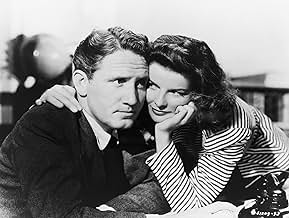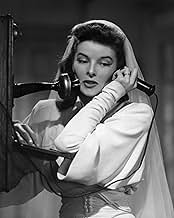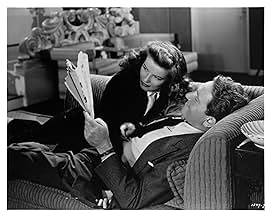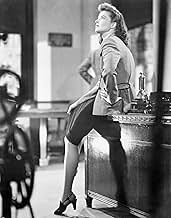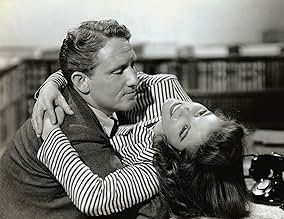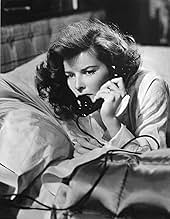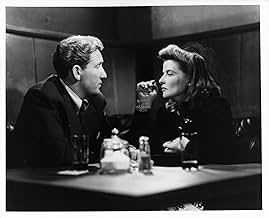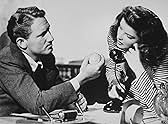CALIFICACIÓN DE IMDb
7.1/10
12 k
TU CALIFICACIÓN
Sam y Tess, reporteros rivales, se enamoran y se casan, pero su relación se resiente cuando a Sam empieza a molestarle el ajetreado estilo de vida de Tess.Sam y Tess, reporteros rivales, se enamoran y se casan, pero su relación se resiente cuando a Sam empieza a molestarle el ajetreado estilo de vida de Tess.Sam y Tess, reporteros rivales, se enamoran y se casan, pero su relación se resiente cuando a Sam empieza a molestarle el ajetreado estilo de vida de Tess.
- Dirección
- Guionistas
- Elenco
- Ganó 1 premio Óscar
- 5 premios ganados y 2 nominaciones en total
Ludwig Stössel
- Dr. Lubbeck
- (as Ludwig Stossel)
Jimmy Ames
- Cab Driver
- (sin créditos)
Herbert Ashley
- Stage Doorman
- (sin créditos)
Dorothy Ates
- Phone Girl
- (sin créditos)
William Bailey
- Baseball Fan
- (sin créditos)
- Dirección
- Guionistas
- Todo el elenco y el equipo
- Producción, taquilla y más en IMDbPro
Opiniones destacadas
Legend has it that Spencer Tracy said he would cut Katharine Hepburn down to size when upon meeting her in heels for the first time on the set of Woman of the Year.
I think that's what the authors of the screenplay Michael Kanin and Ring Lardner, Jr., had in mind in the script as well. As mismatched a pair if there ever were, he a down to earth sports columnist and she a world famous news reporter and commentator, fall in love.
As her celebrity is much wider known than his, Hepburn expects to have it all her own way. The rest of the film is concerned with their efforts to adjust to each other.
Katharine Hepburn's character is based on liberal radio commentator and reporter Dorothy Thompson. Not surprising that no one has mentioned that yet in all the reviews so far. The giveaway is Tracy first hearing her voice on the radio while in his favorite sports bar on Information Please where Thompson was a guest. Her career petered out after World War II, so she's not known to today's audience.
Writers Kanin and Lardner had as a model for the Tracy character Lardner's own father. Ring Lardner was one the celebrated sports writers of the first half of the 20th century, a great reporter and humorist. While Tracy is not as witty as Ring Lardner, he is definitely as down to earth.
My favorite scene is Spencer Tracy trying to feel comfortable at an international gathering at her place, looking even for people who speak English. Of course she's equally as uncomfortable at William Bendix's bar where Tracy likes to hang out.
Hepburn, comfortable in her celebrity, just sails through life, getting awards here and there. When she thinks of a Greek orphan kid she gets pressured into taking in as another award, that's when Tracy puts his foot down.
Based on some real celebrities, Tracy and Hepburn become those celebrities in the flesh. It's an awesome debut for what turned out to be a great screen team.
Look for fine performances by William Bendix, Fay Bainter, Minor Watson and Dan Tobin. Kanin and Lardner copped the film's only Oscar for an original screenplay. Hepburn was nominated for Best Actress, but lost to Greer Garson in Mrs. Miniver.
If Woman of the Year were remade today, the producers might consider making the woman the sports reporter. Seeing Jeannie Zelasko covering the World Series this year, I'm sure it would work very well.
I think that's what the authors of the screenplay Michael Kanin and Ring Lardner, Jr., had in mind in the script as well. As mismatched a pair if there ever were, he a down to earth sports columnist and she a world famous news reporter and commentator, fall in love.
As her celebrity is much wider known than his, Hepburn expects to have it all her own way. The rest of the film is concerned with their efforts to adjust to each other.
Katharine Hepburn's character is based on liberal radio commentator and reporter Dorothy Thompson. Not surprising that no one has mentioned that yet in all the reviews so far. The giveaway is Tracy first hearing her voice on the radio while in his favorite sports bar on Information Please where Thompson was a guest. Her career petered out after World War II, so she's not known to today's audience.
Writers Kanin and Lardner had as a model for the Tracy character Lardner's own father. Ring Lardner was one the celebrated sports writers of the first half of the 20th century, a great reporter and humorist. While Tracy is not as witty as Ring Lardner, he is definitely as down to earth.
My favorite scene is Spencer Tracy trying to feel comfortable at an international gathering at her place, looking even for people who speak English. Of course she's equally as uncomfortable at William Bendix's bar where Tracy likes to hang out.
Hepburn, comfortable in her celebrity, just sails through life, getting awards here and there. When she thinks of a Greek orphan kid she gets pressured into taking in as another award, that's when Tracy puts his foot down.
Based on some real celebrities, Tracy and Hepburn become those celebrities in the flesh. It's an awesome debut for what turned out to be a great screen team.
Look for fine performances by William Bendix, Fay Bainter, Minor Watson and Dan Tobin. Kanin and Lardner copped the film's only Oscar for an original screenplay. Hepburn was nominated for Best Actress, but lost to Greer Garson in Mrs. Miniver.
If Woman of the Year were remade today, the producers might consider making the woman the sports reporter. Seeing Jeannie Zelasko covering the World Series this year, I'm sure it would work very well.
First 70 minutes: 9 stars. I marveled over the chemistry between Hepburn and Tracy, and even more over her character, who is a highly sophisticated, intelligent, strong, funny, and romantic woman. She calls the shots, interviews heads of state, flies all over the world, speaks what seems like every language, and can hold her own drinking Scotch. At the same time, she falls for this salty sports reporter and her body language and affection for him are so tender, including when she re-assures him that he won't feel like a weekend guest while staying in her apartment on their honeymoon night with a wonderful little hint of seductiveness, and when she says "hello daddy" in a baby voice when he comes home one night. My favorite bit of dialogue was this though, where he shows such interest and acceptance of her; the way that they look at each other is wonderful:
Hebpurn: Well, we're alone. Talk. You do have something to talk about? Tracy: Yeah, yeah. You. You. I'd like to know what you like and don't like, and how you feel about being you. Hepburn: I feel very good about it. Always have. I like knowing more about what goes on than most people. Tracy: And telling them. Hepburn: Yeah, and telling them.
Last 45 minutes: 5 stars. The film starts unraveling with Hepburn's rash decision to adopt a refugee, not because that's a bad thing (it's a great thing), but because she does so without telling her husband, or without the slightest thought to actually caring for the child. It spirals from there until that horrific prolonged ending scene, where this intelligent, brilliant woman fumbles around in the kitchen, apparently not knowing how to use a toaster. It's, quite frankly, god-awful on every possible level.
The message is loud and clear: if a woman chooses to focus on a career, she will neglect her husband, not have a clue about raising kids, and be incompetent at performing wifely tasks like making breakfast. It's terribly insulting, and undoes a lot of the great things it did in the first 70 minutes. Hepburn's character wins the "Woman of the Year" award, but it's ironically Tracy who is showcased as award-worthy, for having put up with the "difficult case" of his wife, remained level-headed, and taught her a good lesson in what it takes to have a good marriage.
The only small saving grace is that his character suggests she can have both, a career and a family, as long as she doesn't go to extremes in either. It's only too bad the film didn't simply show us how women can do this balancing just as well as men, but it was 1942, and a lot of people - including those in powerful positions - were simply not ready for this message.
Hebpurn: Well, we're alone. Talk. You do have something to talk about? Tracy: Yeah, yeah. You. You. I'd like to know what you like and don't like, and how you feel about being you. Hepburn: I feel very good about it. Always have. I like knowing more about what goes on than most people. Tracy: And telling them. Hepburn: Yeah, and telling them.
Last 45 minutes: 5 stars. The film starts unraveling with Hepburn's rash decision to adopt a refugee, not because that's a bad thing (it's a great thing), but because she does so without telling her husband, or without the slightest thought to actually caring for the child. It spirals from there until that horrific prolonged ending scene, where this intelligent, brilliant woman fumbles around in the kitchen, apparently not knowing how to use a toaster. It's, quite frankly, god-awful on every possible level.
The message is loud and clear: if a woman chooses to focus on a career, she will neglect her husband, not have a clue about raising kids, and be incompetent at performing wifely tasks like making breakfast. It's terribly insulting, and undoes a lot of the great things it did in the first 70 minutes. Hepburn's character wins the "Woman of the Year" award, but it's ironically Tracy who is showcased as award-worthy, for having put up with the "difficult case" of his wife, remained level-headed, and taught her a good lesson in what it takes to have a good marriage.
The only small saving grace is that his character suggests she can have both, a career and a family, as long as she doesn't go to extremes in either. It's only too bad the film didn't simply show us how women can do this balancing just as well as men, but it was 1942, and a lot of people - including those in powerful positions - were simply not ready for this message.
Most commentators on this movie miss the its point completely, and criticize what they misunderstand as the outdated sexual politics of the 1940's from the standpoint of the outdated sexual politics of the 1970's. Blinded by political correctness, they miss the many virtues of the sparkling script.
The point of the script is actually relatively modest. It is not, in fact it is far from, The Taming of the Shrew, or the subjugation of the independent woman. Tracy's character admires Hepburn's character's independence and competence, and he doesn't want her to renounce them to become the "little woman" -- that is the burden of his "kitchen speech" at the end. He simply understands better than she does, at least until the end of the film, that maintaining a relationship and a marriage requires time, work, and attention. That may well be an unwelcome message, but it is not an unwise one.
The comedy of the film comes from their characters' different worlds -- Tracy is a sportswriter and Hepburn an international politics columnist. The drama comes from their different levels of commitment to being a couple. The script delicately and for the most part successfully (with the possible exception of the Greek orphan subplot), balances these two conflicts and the comedy and drama.
The point of the script is actually relatively modest. It is not, in fact it is far from, The Taming of the Shrew, or the subjugation of the independent woman. Tracy's character admires Hepburn's character's independence and competence, and he doesn't want her to renounce them to become the "little woman" -- that is the burden of his "kitchen speech" at the end. He simply understands better than she does, at least until the end of the film, that maintaining a relationship and a marriage requires time, work, and attention. That may well be an unwelcome message, but it is not an unwise one.
The comedy of the film comes from their characters' different worlds -- Tracy is a sportswriter and Hepburn an international politics columnist. The drama comes from their different levels of commitment to being a couple. The script delicately and for the most part successfully (with the possible exception of the Greek orphan subplot), balances these two conflicts and the comedy and drama.
this film sparkles like champagne. Okay the plot is flimsy, not to mention corny, but the magnetism and chemistry that goes on between Tracy and Hepburn is enough to keep you enthralled for hours. The dialogue is witty and snappy, and there are many hilarious moments not to be missed. It's lovely to see such an old fashioned fun movie that makes you laugh and cry at the same time. The most wonderful moment in the film has got to be when they kiss for the first time, it's wonderful, and you can feel the warmth between them.
... then start here, where they were introduced to each other and fell in love. You can actually feel that love in their performances. Tracy plays a sportswriter, Sam Craig, not a particularly well traveled man or a deep thinker. Hepburn plays Tess Harding, an international affairs correspondent, and with the world at war there is much to correspond about. Thus she runs around at a dizzying pace and I lost count of how many languages Tess spoke. Her mother died when she was an infant, and she grew up globetrotting with her father, and only returned to America as an adult.
Tess and Sam meet when they have a war of words in their articles over baseball, and when the editor tells them to make up, that is when they begin seeing each other. Now Tess doesn't hide how busy she is, or how full her apartment often is of people from all over the world that she knows, yet Sam marries her and I get the feeling that he is disappointed that nothing changes. Their wedding being practically a drive through affair should have given him a hint.
So naturally the marriage eventually fails when Sam walks out. That is Tess' first surprise. Her second surprise is when the woman she has patterned herself after for years and years, Ellen Whitcomb (Fay Bainter), makes a totally unexpected, but not unwelcome, move. How does this all work out? Watch and find out.
I'm not sure this film is ultimately sexist or feminist. It does look like the script was trying to paint Hepburn's character as an ice queen, and she just acted her way out of being portrayed in that fashion. She ultimately plays it as a person who, if she takes up a task, goes all the way with it, right down to the humorous scene where she tries to make breakfast and acts like every utensil in the kitchen is from another planet, yet she persists in the face of hilarious adversity and inexperience. However, if you turn the roles of Sam and Tess around, you could say this was a feminist film, maybe giving men a dose of their own 1942 medicine when they expected women to just live with whatever work schedule the man had, even if they sat home alone at nights.
I'd highly recommend this as one of the great romantic films, and they didn't make many of those during WWII outside of Casablanca.
Tess and Sam meet when they have a war of words in their articles over baseball, and when the editor tells them to make up, that is when they begin seeing each other. Now Tess doesn't hide how busy she is, or how full her apartment often is of people from all over the world that she knows, yet Sam marries her and I get the feeling that he is disappointed that nothing changes. Their wedding being practically a drive through affair should have given him a hint.
So naturally the marriage eventually fails when Sam walks out. That is Tess' first surprise. Her second surprise is when the woman she has patterned herself after for years and years, Ellen Whitcomb (Fay Bainter), makes a totally unexpected, but not unwelcome, move. How does this all work out? Watch and find out.
I'm not sure this film is ultimately sexist or feminist. It does look like the script was trying to paint Hepburn's character as an ice queen, and she just acted her way out of being portrayed in that fashion. She ultimately plays it as a person who, if she takes up a task, goes all the way with it, right down to the humorous scene where she tries to make breakfast and acts like every utensil in the kitchen is from another planet, yet she persists in the face of hilarious adversity and inexperience. However, if you turn the roles of Sam and Tess around, you could say this was a feminist film, maybe giving men a dose of their own 1942 medicine when they expected women to just live with whatever work schedule the man had, even if they sat home alone at nights.
I'd highly recommend this as one of the great romantic films, and they didn't make many of those during WWII outside of Casablanca.
¿Sabías que…?
- TriviaKatharine Hepburn refused to reveal who wrote the screen play to Louis B. Mayer until after he bought the project from Hepburn. Hepburn was afraid that Mayer would low-ball the two authors (Michael Kanin and Ring Lardner Jr.) because, at the time, they were both relatively unknown.
- ErroresIn the kitchen, Tess uses a vacuum coffee maker (Cona). However, if she had put the coffee in the bottom of the coffee maker and the water in the top, as shown, it wouldn't have made coffee at all.
- Citas
Tess Harding: [In the stands at the ballpark, observing the large crowd in attendance] Are all these people unemployed?
Sam Craig: No, they're all attending their grandmother's funeral.
- Versiones alternativasThere is an Italian edition of this film on DVD, distributed by DNA Srl: "LA DONNA DEL GIORNO (1942) + INCANTESIMO (1938)" (2 Films on a single DVD, with "Woman of the Year" in double version 1.33:1 and 1.78:1), re-edited with the contribution of film historian Riccardo Cusin. This version is also available for streaming on some platforms.
- ConexionesFeatured in George Stevens: A Filmmaker's Journey (1984)
- Bandas sonorasBridal Chorus (Here Comes the Bride)
(1850) (uncredited)
from "Lohengrin"
Written by Richard Wagner
Played on an organ at the wedding
Selecciones populares
Inicia sesión para calificar y agrega a la lista de videos para obtener recomendaciones personalizadas
- How long is Woman of the Year?Con tecnología de Alexa
Detalles
- Tiempo de ejecución
- 1h 54min(114 min)
- Color
- Relación de aspecto
- 1.37 : 1
Contribuir a esta página
Sugiere una edición o agrega el contenido que falta



